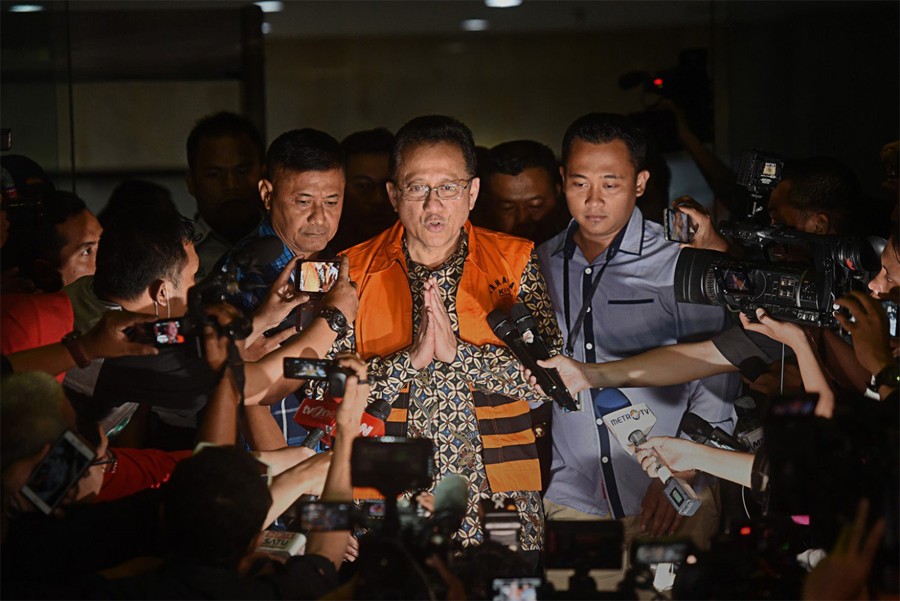Popular Reads
Top Results
Can't find what you're looking for?
View all search resultsPopular Reads
Top Results
Can't find what you're looking for?
View all search resultsJokowi’s withering graft fight
Change text size
Gift Premium Articles
to Anyone
A
fter a turbulent first year that saw conflict among law enforcement institutions, President Joko “Jokowi” Widodo’s administration put the brakes on corruption eradication in his second year, chasing only after minor cases.
Hundreds of cases have been left in limbo at the National Police, the Attorney General’s Office (AGO) and the Corruption Eradication Commission (KPK).
Once a combative body, the KPK now also appears toothless in its investigation capacity as it only appears to focus on sting operations on low-ranking officials, such as court clerks, lowly Supreme Court (MA) officials, local lawmakers, district judges and prosecutors, for accepting relatively minor bribes.
In terms of quantity, current KPK leaders are applauded for conducting a total of 14 arrests since January. The arrests involved bribes of small amounts and the officials involved are not of high profile.
Recently ousted Regional Representatives Council (DPD) chief Irman Gusman, who allegedly accepted a Rp 100 million (US$7,688) bribe, is the only high profile figure netted from recent KPK investigations.
“[President Jokowi’s] Cabinet choices tell us that he bows down to politics, leaving the law enforcement agenda behind political and economic priorities. A strong political and economic system has its foundations in good law enforcement, but Jokowi has it the other way around,” said Gadjah Mada University Corruption Studies Center (PUKAT) director Zainal Arifin.
Conflict between the KPK and police erupted earlier last year when the antigraft body named then National Police chief candidate Budi Gunawan, a confidant of Indonesian Democratic Party (PDI-P) matron Megawati Soekarnoputri, a suspect in a bribery case.
The graft charges, which were later dropped, led to the detention of former KPK commissioners, and brought a crisis among law enforcement institutions.
Jokowi later managed to bring back harmony among the two institutions and mend ties with Budi and the PDI-P. Budi is now the chief of the State Intelligence Agency (BIN). In a bid to conduct major reform within the police, the President made another breakthrough by elevating rising police star Tito Karnavian as the youngest National Police chief.
Tito is currently on a reform mission as he has recently implemented a nationwide operation to combat the practice of illegal levies, including within his own institution.
Despite the bold move, the Jokowi administration cannot boast much about achievement.
The Indonesia Corruption Watch (ICW) recorded in the first half of this year that the three law enforcement institutions only managed to begin investigations into 210 cases, lower than that of last year when 308 new cases were investigated.
In addition to the notoriety, graft convicts during the second year of Jokowi’s presidency, also received shorter sentences, with ICW revealing that in the first half of this year the average verdict handed down to convicts was two years and one month.
The country’s graft fight came to notoriety when the KPK sentenced former NasDem Party secretary-general Rio Capella to one-and-a-half years after being convicted of accepting Rp 200 million in bribes.
Saldi Isra, a law professor from Andalas University said the current KPK officials appeared reluctant to investigate big cases because they feared that they would not receive any backing from Jokowi should they receive retaliation by the police for investigating big cases involving high profiles figures, including the police’s top brass.
“Current commissioners appear to be traumatized by the previous conflict in 2015. It has made them more apprehensive,” Saldi said.
KPK commissioner La Ode Muhammad Syarief acknowledged that the agency had not been productive this year.
“We have only around 160 investigators and prosecutors while at the same time we investigate 70 to 90 cases every year. We have also have several cases from 2015 that are still unfinished,” La Ode said.
________________________
To receive comprehensive and earlier access to The Jakarta Post print edition, please subscribe to our epaper through iOS' iTunes, Android's Google Play, Blackberry World or Microsoft's Windows Store. Subscription includes free daily editions of The Nation, The Star Malaysia, the Philippine Daily Inquirer and Asia News.
For print subscription, please contact our call center at (+6221) 5360014 or subscription@thejakartapost.com










